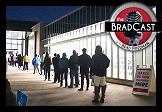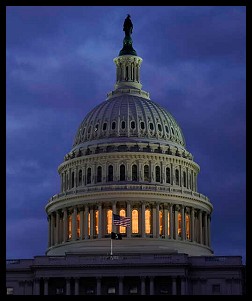 On today's BradCast, we continue to focus on the critical November 8 midterms as we will most likely be doing between now and then and --- given how important and close many key races are expected to be --- probably well beyond Election Day. [Audio link to full show follows this summary.]
On today's BradCast, we continue to focus on the critical November 8 midterms as we will most likely be doing between now and then and --- given how important and close many key races are expected to be --- probably well beyond Election Day. [Audio link to full show follows this summary.]
We're joined today by EDDIE PEREZ, who has spent more than 20 years focused on elections in various capacities. He spent some 15 years at the Austin, Texas-based Hart-Intercivic, one of the big three private voting system vendors in the U.S. He moved on to become Global Director of Technology and Standards at the nonpartisan, nonprofit Open Source Election Technology (OSET) Institute before, last year, becoming Twitter's Director of Product Management for Societal Health, where he played a role in fighting against mis- and disinformation at the beleaguered social media site. He left the company recently (before Elon Musk's takeover) and remains a Board Member at OSET.
Perez has been writing, blogging and tweeting of late on what he sees as "manufactured chaos" by Republicans in advance of the 2022 midterms, calling the threat they pose a "a knife at democracy's throat" and charging that the chaos is now "on a collision course" with next week's elections.
He worries and warns, both in his writing and on today's program, of "coordinated attempts to interfere with or potentially overwhelm what can broadly be regarded as normal election administration processes."
As usual, when Perez is kind enough to join us, he (a former voting system vendor) and I (a long time Election Integrity journalist and critic of vulnerable, difficult-to-oversee voting systems) both tussle and find common ground on many of these topics. We also discuss concerns about "manufactured chaos" on Twitter as well, now that Musk has reportedly withdrawn access to content moderation tools previously used by staffers to help curb toxic disinformation.
"It's genuinely not really clear whether Elon Musk fully appreciates the harm that can come from a social media platform, particularly in the realm of elections," Perez frets, adding that "we have seen this spin off in to political violence." He notes "the concerns are very real," but believes the "wheels haven't fallen off Twitter", at least not yet, assuring that there are "still good people there."
He warns, however, "it's a fragile time" and says it's good to have "conversations like this so that we can talk to your listeners about what they should be paying attention to and what they can maybe do to cut through some of the noise."
We discuss examples of chaos that most worry him and how no small part of the lack of confidence Americans now have in our election system may actually be due to the way voting system vendors and election officials have spent years preventing oversight by the public. Of course, much of it is due to Donald Trump's lies about the 2020 election. But Perez concedes that insiders, in fact, now pose a unique threat to democracy, as demonstrated by GOP officials facilitating the breach of voting system hardware and software in several different states and releasing its proprietary software to potentially nefarious individuals. Can that previously secret code now be used to undermine those systems next week? If so, how so?
"It has certainly not helped public trust in the machinery of democracy that voting technology is limited to as few companies as it is," Perez concedes, citing the proprietary software now used to run elections and tally votes in almost every jurisdiction in the country. "There is no doubt that having that whole ecosystem --- that can fairly be called a 'black box' --- is not helping. It is a kind of tinder box and has turned into a vacuum of information that a lot of conspiracy theorists have been happy to fill."
"On something as essential as the legitimacy of the outcomes in our public elections --- which, again, involves process and involves voting technology --- we can never ever discount the importance of transparency and accountability," he tells me, citing some of my own advocacy and criticism of voting systems and vendors over the years. "In that sense, I don't think it's unreasonable for some people to say that was a collective failure and, yes, that has contributed to us having a lot of the challenges that we're in today."
Of course, we also discuss what Americans can do now --- from voters to election officials to journalists --- to gird for the chaos that is almost certain to come and how best to defend against it.
Also today, several recent legal rulings in response to an explosion of election law challenges manufacturing more chaos around the 2022 elections...
- Our corrupt U.S. Supreme Court, along with the unexpected death of the Pennsylvania Supreme Court's Chief Justice, allows Republicans to obtain a ruling that may allow them to reject thousands of completely legitimate absentee ballots across the Keystone State, due to missing or incorrect dates written on their outer envelopes.
- A Trump-appointed federal judge in Arizona issues a ruling [PDF] to block voter intimidation near absentee ballot drop boxes, where masked rightwingers, toting guns and clad in tactical gear, have been menacing and photographing voters dropping of their ballots.
- Nevada's Sec. of State shuts down a slapdash, nascent rightwing effort in Nye County to hand-count early and absentee ballots after the hand-counters were said to be revealing results to the public during their tally in defiance of a state Supreme Court order. Thankfully, given the very few ballots they were able to count before being shut down (just 50 on their first day, in a County with some 30,000 voters), the damage was contained. But expect more such "manufactured chaos" between now and next Tuesday and, almost certainly, well beyond...
(Snail mail support to "Brad Friedman, 7095 Hollywood Blvd., #594 Los Angeles, CA 90028" always welcome too!)
|


 Sunday 'Your Choice' Toons
Sunday 'Your Choice' Toons The GOP 'Voter Fraud'
The GOP 'Voter Fraud' 'Green News Report' 10/31/24
'Green News Report' 10/31/24
 'Closing Arguments'with Digby and Driftglass: 'BradCast' 10/30/24
'Closing Arguments'with Digby and Driftglass: 'BradCast' 10/30/24 Trump Promises to be a Lawless, Authoritarian President. Believe Him: 'BradCast' 10/29/24
Trump Promises to be a Lawless, Authoritarian President. Believe Him: 'BradCast' 10/29/24 'Green News Report' 10/29/24
'Green News Report' 10/29/24 Ballots Burn, Billionaires 'Obey in Advance', Callers Ring In: 'BradCast' 10/28/24
Ballots Burn, Billionaires 'Obey in Advance', Callers Ring In: 'BradCast' 10/28/24 Musk's Privatized Internet Satellite System Threatens U.S. National Security
Musk's Privatized Internet Satellite System Threatens U.S. National Security Sunday 'VOTE NOW!' Toons
Sunday 'VOTE NOW!' Toons 'Green News Report' 10/24/24
'Green News Report' 10/24/24 Harris on Hope, Trump's Fasc-ism in Bumpy Closing Days: 'BradCast' 10/24/24
Harris on Hope, Trump's Fasc-ism in Bumpy Closing Days: 'BradCast' 10/24/24 Kelly: Trump 'Fascist', Admires Hitler, Disrespects Law: 'BradCast' 10/23/24
Kelly: Trump 'Fascist', Admires Hitler, Disrespects Law: 'BradCast' 10/23/24 Accountability Comes For Rudy, Other Election Deniers: 'BradCast' 10/22/24
Accountability Comes For Rudy, Other Election Deniers: 'BradCast' 10/22/24 Elon Musk's 'Vote Buying' and Lying for Trump: 'BradCast' 10/21/24
Elon Musk's 'Vote Buying' and Lying for Trump: 'BradCast' 10/21/24 Fake v. Real Censorship and Trump/Fox Fetish-ized Grievance World: 'BradCast' 10/17/24
Fake v. Real Censorship and Trump/Fox Fetish-ized Grievance World: 'BradCast' 10/17/24 'Americans Aren't Prepared for Trump's Police State': 'BradCast' 10/16/24
'Americans Aren't Prepared for Trump's Police State': 'BradCast' 10/16/24 Good News for Georgia Voters, the Economy and Kamala Harris: 'BradCast' 10/15/24
Good News for Georgia Voters, the Economy and Kamala Harris: 'BradCast' 10/15/24 Fascism Comes to America: 'BradCast' 10/14/24
Fascism Comes to America: 'BradCast' 10/14/24
 VA GOP VOTER REG FRAUDSTER OFF HOOK
VA GOP VOTER REG FRAUDSTER OFF HOOK Criminal GOP Voter Registration Fraud Probe Expanding in VA
Criminal GOP Voter Registration Fraud Probe Expanding in VA DOJ PROBE SOUGHT AFTER VA ARREST
DOJ PROBE SOUGHT AFTER VA ARREST Arrest in VA: GOP Voter Reg Scandal Widens
Arrest in VA: GOP Voter Reg Scandal Widens ALL TOGETHER: ROVE, SPROUL, KOCHS, RNC
ALL TOGETHER: ROVE, SPROUL, KOCHS, RNC LATimes: RNC's 'Fired' Sproul Working for Repubs in 'as Many as 30 States'
LATimes: RNC's 'Fired' Sproul Working for Repubs in 'as Many as 30 States' 'Fired' Sproul Group 'Cloned', Still Working for Republicans in At Least 10 States
'Fired' Sproul Group 'Cloned', Still Working for Republicans in At Least 10 States FINALLY: FOX ON GOP REG FRAUD SCANDAL
FINALLY: FOX ON GOP REG FRAUD SCANDAL COLORADO FOLLOWS FLORIDA WITH GOP CRIMINAL INVESTIGATION
COLORADO FOLLOWS FLORIDA WITH GOP CRIMINAL INVESTIGATION CRIMINAL PROBE LAUNCHED INTO GOP VOTER REGISTRATION FRAUD SCANDAL IN FL
CRIMINAL PROBE LAUNCHED INTO GOP VOTER REGISTRATION FRAUD SCANDAL IN FL Brad Breaks PA Photo ID & GOP Registration Fraud Scandal News on Hartmann TV
Brad Breaks PA Photo ID & GOP Registration Fraud Scandal News on Hartmann TV  CAUGHT ON TAPE: COORDINATED NATIONWIDE GOP VOTER REG SCAM
CAUGHT ON TAPE: COORDINATED NATIONWIDE GOP VOTER REG SCAM CRIMINAL ELECTION FRAUD COMPLAINT FILED AGAINST GOP 'FRAUD' FIRM
CRIMINAL ELECTION FRAUD COMPLAINT FILED AGAINST GOP 'FRAUD' FIRM RICK SCOTT GETS ROLLED IN GOP REGISTRATION FRAUD SCANDAL
RICK SCOTT GETS ROLLED IN GOP REGISTRATION FRAUD SCANDAL VIDEO: Brad Breaks GOP Reg Fraud Scandal on Hartmann TV
VIDEO: Brad Breaks GOP Reg Fraud Scandal on Hartmann TV RNC FIRES NATIONAL VOTER REGISTRATION FIRM FOR FRAUD
RNC FIRES NATIONAL VOTER REGISTRATION FIRM FOR FRAUD EXCLUSIVE: Intvw w/ FL Official Who First Discovered GOP Reg Fraud
EXCLUSIVE: Intvw w/ FL Official Who First Discovered GOP Reg Fraud GOP REGISTRATION FRAUD FOUND IN FL
GOP REGISTRATION FRAUD FOUND IN FL



















 We've been discussing for weeks (months, actually) on
We've been discussing for weeks (months, actually) on 







 We're just over one week from the most critical midterm elections in these United States since the Civil War. So, we've got a lot to discuss on today's
We're just over one week from the most critical midterm elections in these United States since the Civil War. So, we've got a lot to discuss on today's 
 The element of surprise plays a central role in several of the stories covered on today's
The element of surprise plays a central role in several of the stories covered on today's 
 On today's
On today's  Some good news, some bad news, and the most difficult news of all for talk radio: nuanced news on today's
Some good news, some bad news, and the most difficult news of all for talk radio: nuanced news on today's 
 Today on
Today on  I was a long time Bernie Sanders supporter. I still am. As an attorney and Vietnam veteran I even served as a Senior Adviser to Vets for Bernie during his 2016 campaign. I also supported Sen. Sanders during the 2020 primaries. That was then. This is 2022.
I was a long time Bernie Sanders supporter. I still am. As an attorney and Vietnam veteran I even served as a Senior Adviser to Vets for Bernie during his 2016 campaign. I also supported Sen. Sanders during the 2020 primaries. That was then. This is 2022.
 Today on
Today on  It's a grab bag on today's
It's a grab bag on today's 













